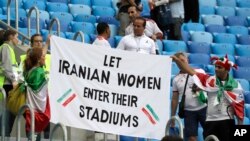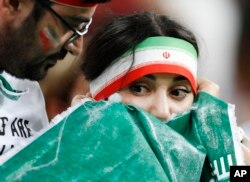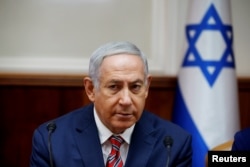As the Iranian football team participated in three of its group stage games at the 2018 World Cup in Russia this month, rights groups and the Iranian regime's rivals are using the sports spotlight to push for social and political change in the country.
The men's football team, known as Team-e-Melli, was unable to collect enough points for the next round and left the tournament Monday after a dramatic draw against Portugal in the Russian city of Saransk.
Despite the loss, the game is seen by many rights watchdogs as a victory for freedom as Iran's conservative rulers last week for the first time allowed women to join men to watch the live screening of the last two games of Team Melli in Tehran's Azadi stadium.
Human Rights Watch said Thursday the move by the Iranian authorities was a step in the right direction, calling on Iranian officials and the International Federation of Football Associations (FIFA) to guarantee that women and girls can freely attend all future men's sports matches in the country.
"Iranian authorities have finally taken a long-awaited step of de facto overturning the ban on women attending stadiums in the past two games," the organization's Middle East director Sarah Leah Whitson said in a statement.
"This experience shows how shallow the many justifications for keeping women out of the stadiums were, and Iran should ensure that women can freely attend all sporting events across the country from now on," she said.
Since the revolution in 1979, Iran's conservatives have used their control over the state to impose strict laws on their citizens. Hardline rulers have said it is un-Islamic for women to attend certain men's sporting events, especially football matches, which were banned for female fans in 1981. The ban was extended to volleyball in 2012.
The Iranian women campaigners and rights activists have protested the ban over the past few years. Well-known athletes and parliament members later joined the campaign and urged the government to lift its restrictions on women.
Last March, President Hassan Rouhani pledged to remove the ban following a protest in front of Azadi stadium by a group of women seeking admission to watch a game between two popular Tehran men's football teams, Esteqlal and Persepolis. The protest led to the arrest of 35 protesters.
The change in law, which went into effective June 20, opened Azadi stadium gates for thousands of women covered in paint depicting national football team's colors and waving the country's national flags. The joyful women excitedly cheered after the Iranian goalkeeper Alireza Beiranvand was able to block a penalty kick from internationally renowned Portuguese football legend Cristiano Ronaldo.
Israel's praise
Shortly after the match, the Israeli prime minister praised the Iranian team's performance and used the occasion to encourage the expansion of recent protests in Iran.
"To the Iranian people I say: You showed courage on the playing field, and today you showed the same courage in the streets of Iran," Benjamin Netanyahu said in a video released Wednesday on his twitter account.
Big protests have erupted in Iran in recent weeks in response to the soaring cost of living and the plummeting value of the Iranian rial currency. The rial has lost more than 40 percent of its value since May when the U.S. decided to withdraw from the Iranian nuclear deal.
"Iran has many problems — air pollution, water scarcity, billions wasted on terror. Can you imagine what would happen if the Iranian government instead of wasting your money in Syria, in Yemen and unnecessary wars in the Middle East, would start investing in solving these problems in Iran?" Netanyahu asked in his address to the Iranians.
"One day I hope to watch Iran's soccer team go head-to-head against Israel in a free Tehran. On that day, we'll all be winners," Netanyahu added.
Tensions are mounting between Israel and Iran over the change of power balance in the Middle East. Iran has used the aftermath of the Arab Spring and the fall of the Islamic State to expand its influence from Yemen, to Iraq and Israel's borders with Syria and Lebanon.
The two countries confronted each other directly in February when an Israeli F-16 striking Iran-backed positions inside Syrian territory was shot down by the Syrian air defense.



